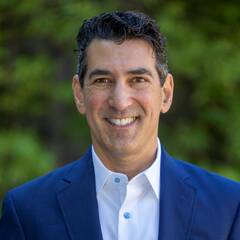mourning
04/01/2024 09:00:36 AM

As long as I have been a rabbi and have been composing eulogies to give comfort to mourners, I have found tremendous power in these words by Rabbi Sidney Greenberg: “The Psalmist wisely spoke of walking ‘through the valley of the shadow.’ No road of life can detour around the valley. By the same token, however, the valley is open on both sides. Having entered into it, we need not make of it our permanent dwelling place. After we have lingered there for a while, we can walk though it and out. With the Psalmist we can then affirm gratefully out of the depths of our own experience: ‘Though weeping tarries in the night, joy comes in the morning.’”
I have tried to bring comfort to countless mourners, I have been a mourner myself for a father, a mother-in-law, and a great-nephew, but my experiences this March as a mourner bring new levels of empathy for what it means to walk through the valley of the shadow. Within twenty-four hours of each other, my mother, Francine Feder, and my father-in-law, Joseph Bodovitz, entered hospice care. They were 90- and 93-years-old, respectively, so their deaths were neither a tragedy nor a surprise. They lived full and good lives and we saw their declines with clarity.
But when they died two and four days, respectively, after they began hospice care, the losses hit me hard. I am grateful that my families had precious and beautiful moments with our loved ones in the final days and hours. The reality of what final days and hours look like and feel like to those surrounding the dying person can be very difficult. The last moments of my mother’s life were particularly poignant. Being by her bedside for many hours, the family was gathered, and it was clear the end was quite close. I began to hold her and sing Sim Shalom, as other family members joined with me. Then we sang Shalom Rav. And finally, Hashkiveinu. As we sang the last notes of the prayer, our mouths closed, she took her last breath. We were comforted feeling that we had helped her ease her hold on life in this world and helped her to enter the world to come.
Only fifty-five hours later, my father-in-law, Joe, would take his last breath. We were tremendously comforted by the rituals of our people. The tradition of burial as close to the time of death as possible is so healthy, for it ensures that we confront and embrace the terribly difficult and painful notion that our loved one is physically dead. The funeral services were touching and nourishing, and seeing the faces of our community members surrounding us brought us so much comfort and uplifted our spirits. And the burial services, while so very difficult, brought a sense of completion that was necessary and helpful to our mourning process.
I had thought that I was mourning fully and well, and perhaps I was. And yet, the waves of emotion and unpredictability of when the waves would hit threw me for a loop. It is hard to mourn and really grieve. Our American culture does not promote grieving well. We model how to compartmentalize and move on, but that’s not mourning. I have taken great comfort and listened with particular interest to the considerable wisdom of those who speak of their loved ones before the Kaddish prayer and who have shared kernels about mourning with me privately. Please share your stories and memories about your grief and how you mourned, as I realize that grief, mourning, and suffering, is one of the powerful things that bind us all together. If you have been fortunate enough to love or be loved, chances are you have mourned, or you will mourn. There is no detour around the mourner’s path. As much as we wish it weren’t so, there is no rushing mourning either. It just takes time.
I also know that pain doesn’t go away. How could it? But I know that the pain will not always feel as it does right now. I hope with all of my heart that in the weeks and months ahead, there will still be room in my heart for smiles, joy and blessings, and that at the end of the year of mourning, the sun will shine brighter once again and that the piercing sting of sorrow will lessen.
Yesterday a friend gave my wife and me a beautiful wind chime. It makes a rich, beautiful sound. The friend also included the wonderful poem, We Remember Them. The line, “When we are lost and sick at heart, we remember them,” rings with ever-increasing depth. As Sandra and I hear the chimes, though, we are taking great comfort in the poem’s concluding line: “So long as we live, they too, will live, for they are now a part of us, as we remember them.”
I called Cantor Barry Reich after my mother died, and he reminded me that the ones we love are always with us. That never dies or goes away. They are always there. And that’s part of the beauty in our notion of the immortality of soul. Our loved ones live on in the world to come and they live on in our hearts and here on earth in all the beauty that they created.
May the hearts of all of the sorrowing find comfort and solace.






